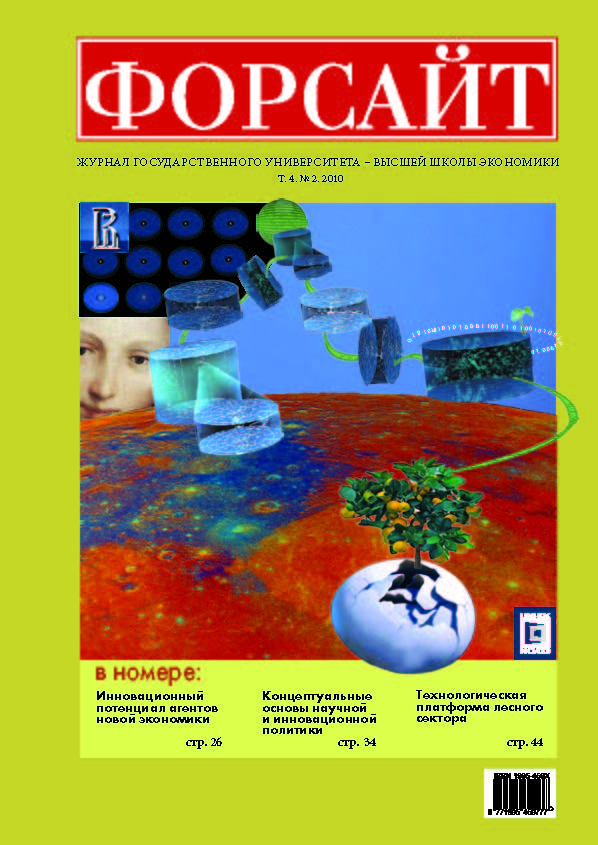Abstract
The article is devoted to the problems of Special Economic Zones (SEZs) in Russia. These zones are not special enough to result in a major foreign direct investment inflow, which is a prerequisite for economic modernisation.It is noted that the Russian innovation policy is concentrated on technological development; however, today some 60% of the country’s GDP is formed by services. Therefore, service-oriented innovations are expected to create economic impact. In this regard without the participation of the world’s leading innovating companies, innovation reform will remain a political exercise. The authors are confident that the mobilisation of the private sector’s R&D expenditure is key in modernising Russia’s natural resource-based economy.
References
Ahrens J., Meyer-Baudeck A. (1995) Special economic zones: Shortcut or roundabout way towards capitalism? // Intereconomics. V. 30. № 2. P. 87-95.
BFAI (1986) Rechtsinformationen. Berichte und Dokumente zum auslдndischen Wirtschafts- und Steuerrecht. Koln. № 202.
Bhardwaj R. (1993) China's Economic Reform: The Role and Significance of SEZs // Strategic Analysis. V.2. P. 1089-1126.
Buck T., Filatotchev I., Nolan P., Wright, Mike (2000) Different Paths to Economic Reforms in Russia and China: Causes and Consequences // Journal of World Business. V. 35. № 4. P. 379-400.
Dezhina I., Peltola K. (2008) International Learning in Innovation Area: Finnish Experience for Russia // Electronic Publications of Pan-European Institute. http://www.tse.fi/pei.
Djankov S., Yingyi Q., Gerard R., Zhuravskaya E. (2006) Entrepreneurship in China and Russia Compared // Journal of the European Economic Association. V. 4. № 2-3. P. 352-365.
Garcia J.G., Lora J.S. (2009) Shenzhen, Zona Economica Especial: Bisagra de la Apertura Economica y el Desarrollo Regional Chino, Problemas del Desarrollo // Revista Latinoamericana de Economia. V. 40. № 156. P. 101-124.
Ge W. (1999) Special Economic Zones and the Opening of the Chinese Economy: Some Lessons for Economic Liberalization // World Development. V. 27. № 7. Р. 1267-1285.
Gilman M. (2009) A New Wave of Privatization, Russian-Style // The Moscow Times.
Grьtzmann K., Halme K., Reiner R. (2009) Emerging Economies (BRIC Countries) and Innovation. Inno-Views Policy Workshop. Brussels. http://www.proinno-europe.eu.
ILO (2010) Labour Statistics. http://www.ilo.org.
Kaartemo V. (2009) Russian innovation system in international comparison - the BRIC countries in focus // Electronic Publications of Pan-European Institute. http://www.tse.fi/pei.
Kaartemo V., Lisitsyn N., Peltola K. (2009) Innovation infrastructure in St. Petersburg - Attractiveness from the Finnish managerial perspective // Electronic Publications of Pan-European Institute. http://www.tse.fi/pei.
Kivikari U. (2007) The Baltic Sea region as Finland's economic environment. Prime Minister's Office Publications. http://www.vnk.fi/english.
Knoth C. (2000) Special Economic Zones and Economic Transformation The Case of the People's Republic of China. Dissertation. Universitдt Konstanz.
Liuhto K. (2008) Genesis of Economic Nationalism in Russia // Electronic Publications of Pan-European Institute. http://www.tse.fi/pei.
Liuhto K. (2009) Особые экономические зоны в России: что они могут предложить иностранным фирмам // Экономическая политика. №5.
Liuhto K., Vahtra P. (2009) Who governs the Russian economy? A cross-section of Russia's largest corporations // Electronic Publications of Pan-European Institute. http://www.tse.fi/pei.
Medetsky A. (2009) Medvedev Tells State Firms to Boost R&D // The Moscow Times. December 28.
Meng G. (2005) Experiences and Prospects of China's Free Economic Zones after over 20 years // Chinese Business review. V. 4. №. 9. P. 29-40.
RosOEZ (2009) Federal Agency for Management of Special Economic Zones. http://eng.www.rosoez.ru.
Tuominen K., Lamminen E. (2008) Russian Special Economic Zones // Electronic Publications of Pan-European Institute. http://www.tse.fi/pei.
UNCTAD (2009) World Investment Report: Country Fact Sheet. http://www.unctad.org/wir.
Wong K.-Y. (1987) China's special economic zone experiment: An appraisal // Geografiska Annaler, Series B. V. 69B. № 1. Р. 27-40.
Wong P. (1989) Special Economic Zones in China. Problems and Prospects / Carino T. (ed.) Transnationals and Special Economic Zones. Р. 25-57.
Ведомости (2005) Интервью с Юрием Ждановым // 22 декабря.
Интерфакс (2009) Медведев заявляет, что российские ОЭЗ должны раскрывать свой потенциал быстрее, чем за 7-10 лет.
Послание Президента Федеральному Собранию (2009) 12 ноября. http://www.kremlin.ru.

This work is licensed under a Creative Commons Attribution 4.0 International License.

